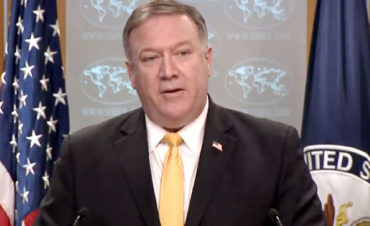
Secretary of State Mike Pompeo says he is making efforts to ensure that Americans have the same access to Tibet that Chinese citizens have to the United States.
Responding to a set of questions raised by the House Committee on Foreign Relations at a hearing on May 23, 2018, Pompeo wrote “I am working to ensure that US journalists, legislators, scholars, and members of civil society have unimpeded access to all areas [of] China, including the Tibet Autonomous Region and Tibetan areas.”
Pompeo was specifically asked about the Reciprocal Access to Tibet Act, which aims to end China’s restrictions on access to Tibet and currently has 51 co-sponsors in the House of Representatives and seven in the Senate.
Ask your representative to co-sponsor the Reciprocal Access to Tibet Act.
Pompeo’s response to the committee shows that the idea of ensuring reciprocal access to Tibet is gaining momentum. The secretary wrote: “President Trump has regularly stated his desire for reciprocity in the US-China relationship. I am committed to pushing for reciprocity regarding the open access China and many other countries enjoy in the United States.”
Answering the committee’s other questions, Pompeo reaffirmed the Trump administration’s commitment to fully implementing the Tibetan Policy Act, which includes the appointment of a Special Coordinator for Tibetan Issues, a position within the State Department that is required by law but still vacant.
Speaking on the topic of prisoners of conscience, Pompeo said he would advocate for the release of Tibetan political prisoners in his discussions with Chinese officials.
Pompeo also reiterated his concern about the human rights situation in Tibet and called on the Chinese government to resume dialogue with the Dalai Lama or his representatives without preconditions.
The secretary’s comments follow his earlier positive statements in response to questions from the Senate Foreign Relations Committee.
The questions from the House committee and Pompeo’s responses are below.
Question:
During the US-China Summits held last April in Florida and last November in Beijing, President Trump did not raise the question of respect for human rights and the rule of law in China and in Tibet. Since 1997, all US Presidents have publicly challenged the sitting Chinese President to negotiate with the Dalai Lama or his representative to find a lasting solution to the Tibetan issue. Would you publicly call on the Chinese President to address the grievances of the Tibetan people through dialogue with the Dalai Lama?
Answer:
I share your concerns about the lack of respect for human rights and rule of law in Tibet. I will urge Chinese authorities to engage in meaningful and direct dialogue with the Dalai Lama or his representatives without preconditions to lower tensions and resolve longstanding differences.
Question:
The Reciprocal Access to Tibet Act is bipartisan legislation that aims at implementing the principle of reciprocity in US-China relations when it comes to access to Tibet for US citizens including diplomats, NGO workers, and journalists. Will you commit to ensuring that the Chinese authorities provide access to Tibet for American officials and citizens, just as Chinese citizens get access to the United States?
Answer:
I am committed to pushing for reciprocity regarding the open access China and many other countries enjoy in the United States and to raising concerns about the lack of regular access to the Tibetan Autonomous Region (TAR) for US journalists, diplomats, academics, and others. I am working to ensure that US journalists, legislators, scholars, and members of civil society have unimpeded access to all areas [of] China, including the Tibet Autonomous Region and Tibetan areas.
Question:
Hundreds of Tibetan political prisoners, according to the Congressional Executive Commission on China, are in prison as we speak and any form of expression of Tibetan identity, be it religious, linguistic or cultural, can be easily criminalized by the Chinese authorities due to the adoption of a patchwork of regulations that deny fundamental and basic human rights. What will your Administration do for the release of the Tibetan political prisoners?
Answer:
I am urging China to cease restrictions on the human rights of Tibetans as well as on their religious, linguistic, and cultural traditions and practices. I am committed to pressing for respect for human rights, including freedom of religion and belief, in my conversations with Chinese officials, and to advocating for the release of Tibetan political prisoners.
Question:
China’s censorship and information and communication blockade, specifically in Tibet, prevents reporters from investigating the reality of the situation in Tibet. What steps will you take with the Chinese authorities to ensure that American journalists will be able to freely access Tibet just as Chinese journalists are able to do so in the United States?
Answer:
President Trump has regularly stated his desire for reciprocity in the US-China relationship. I am committed to pushing for reciprocity regarding the open access China and many other countries enjoy in the United States, including for US journalists seeking to visit the Tibet Autonomous Region and Tibetan areas of China.
Question:
Will you commit to meeting the Dalai Lama, whether in the United States or during your travel, and to express to him the United States support to his peaceful struggle for Tibetan rights?
Answer:
I am fully committed to implementing the Tibetan Policy Act. State Department officials should meet with Tibetan leaders whenever appropriate, including the Dalai Lama in his capacity as an important spiritual leader of the Tibetan people.

